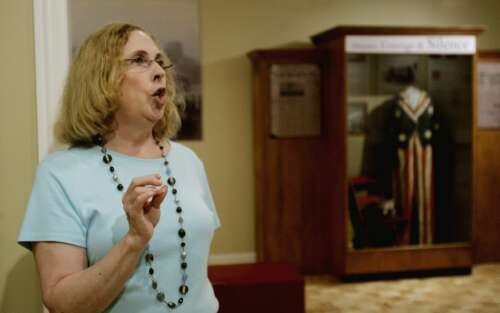Alberta Adamson
Daily Herald file photo, 2010
Twenty-three historical societies or museums help tell the history of towns in DuPage County, according to the Illinois State Historical Society.
But if you want to see a treasure trove of historic artifacts from the county seat in Wheaton, you are out of luck.
A lengthy court battle is still trying to determine what the Wheaton Historic Preservation Council did with its extensive collection and more than $300,000.
It’s been more than two years since the Illinois attorney general sued the council, board members Laurie Warfel and Gloria Leetz, and its president and chief executive officer, Alberta Adamson.
The glacial pace is frustrating local historian Nancy Flannery, who has closely followed the case. At a hearing last week, she wore a sticker that said “904 days,” referring to the length of the proceedings, hoping the judge would notice.
“I just am moved by how big a place the WHPC held in people’s lives, and how important it was and how people now are … upset about not having a historical society, so I jumped in,” Flannery said.
The organization operated the Center for History, first in a Victorian-style house on North Main Street and later in a downtown space that closed about a decade ago. Museum exhibits traced Wheaton’s government history, golf history — it’s the home of Chicago Golf — and Civil War history.
Women’s golf memorabilia was part of an exhibit at the former Center For History in Wheaton.
Daily Herald file photo, 2006
“Then there were a lot of things that did not have, probably did not have, a lot of monetary value but were very important to the people of Wheaton,” Flannery said. “A lot of personal papers, personal photographs of families that had been here a long time.”
The case
The suit alleges the council failed to register as a charity, as required, after 2013. It also says the council lent $120,000 to Adamson and tried to recharacterize it as compensation. In addition, the organization paid Adamson $72,000 for rent and $109,303 for unknown purposes, according to the lawsuit.
The attorney general claims in the lawsuit that Adamson, Leetz and Warfel refused to answer administrative subpoenas requesting information about the artifacts, the loan and other payments.
Leetz was removed as a defendant in November 2022 after an agreement detailing she was not on the board when the payments were approved. She died a month later.
The defendants argue that the council did re-register as a charity.
In a recent filing, the lawyer for Warfel and Adamson attached minutes from several council board meetings. The minutes say Adamson had not been paid since 2009 and that the council owed her back pay in March 2017 of $369,604. In addition, the documents show that Adamson agreed to repay a $120,000 loan once she received her back pay.
According to the minutes, the board agreed to pay Adamson 10 years’ worth of rent because she had used a home office to do work and kept confidential documents, including payroll records and employee reviews, in her home office.
Last August, a DuPage County judge removed Warfel and Adamson as officers and ordered that a receiver be appointed while the case continued. He also ordered Adamson to repay the $109,303.
The case resumes on June 7.
Flannery contends the case is in a “kind of legal limbo” until a receiver is appointed.
“We need resolution,” she said.
Accounting for the artifacts
The minutes the defense presents say the “Civil War collection” was donated to the National Civil War Museum in Pennsylvania; the “World War II collection,” including 100 oral histories, was donated to the National Museum of the Pacific War in Texas; and “slavery documents and artifacts” were returned to owners.
The attorney general’s lawsuit says it has a copy of a 2012 inventory of artifacts, prepared when the WHPC started storing items with the city. It wants to compare that list with what is currently in storage. The lawsuit says Warfel and Adamson refused to let the attorney general’s representatives access the storage space.
City Manager Michael Dzugan confirmed Tuesday that the city continues to store items for the WHPC at no charge. Otherwise, the city does not have anything to do with the items, and the only people allowed in are the directors of the WHPC.
Flannery hopes for “a resurrection of a historical society” in Wheaton. She’s received dozens of calls from people since the WHPC closed its doors, wanting to know if there’s any place they can take artifacts or historical information they have guarded through the years.
“The WHPC needs to, like the Phoenix, rise from the ashes and present a new face to the community. I think it needs a new name,” Flannery said. “I think it needs a different kind of board. I think that it needs to really focus on rebuilding trust with the community.”
